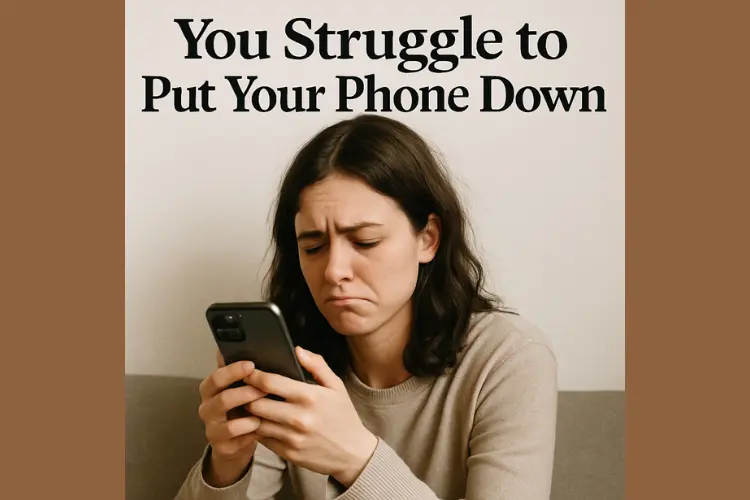Introduction
Social media has become deeply embedded in our daily routines. Whether it’s checking Instagram, scrolling Facebook, or watching TikToks, it feels like second nature. But sometimes, the habit grows into something more concerning—something that quietly takes over your time, attention, and emotional balance. If you find yourself mindlessly refreshing your feed or panicking when you can’t access your phone, it might be time to ask: Am I addicted to social media? In this post, we’ll cover four clear warning signs of social media addiction—and what you can do to take back control.1. When Scrolling Starts Replacing Real Life
Social media is meant to enhance life—not interfere with it. But for many people, the opposite is happening.
If you’ve ever skipped meals, ignored deadlines, or avoided conversations just to spend more time online, this could be a serious sign.
Some examples include:
- Choosing your phone over family dinners
- Delaying tasks because you’re caught in the feed
- Staying up far too late watching short-form videos
When virtual interactions become more important than real ones, it’s a clear indicator that balance has been lost. What begins as entertainment may start affecting your productivity, relationships, and physical well-being.
2. Losing Passion for Things You Used to Enjoy
Think about your favorite pastimes—things you genuinely looked forward to. If you’ve stopped doing them without any specific reason, social media might be filling that gap.
Maybe you used to play sports, read novels, or hang out with friends. Now those hours are spent watching content or creating posts. Over time, hobbies and interests fade away, replaced by screen time.
This shift matters because hobbies:
- Build self-esteem
- Improve emotional health
- Encourage creativity and problem-solving
- Keep us socially active
When social platforms begin to push out meaningful offline activities, it creates an unhealthy dependence. If your child or teenager once loved a sport or club but now prefers endless scrolling, it may not be just a phase.
3. You Struggle to Put Your Phone Down
One of the biggest red flags is the inability to stop checking your device—even when you want to.
Social media platforms are designed to keep you hooked. They use notifications, likes, and endless scrolling to create a loop that triggers dopamine—the brain’s feel-good chemical.
But when you can’t step away, or you constantly interrupt tasks to check your phone, that’s a deeper issue.
Common signs of lost control include:
- Checking your phone within minutes of waking up
- Browsing during meals, meetings, or conversations
- Promising to log off but failing to do so
This behavior becomes a compulsion. You’re no longer engaging for fun—you’re reacting to a habit you can’t seem to break.
4. Feeling Nervous or Restless Without Access
What happens when you’re offline? If you feel stressed, anxious, or left out when you can’t access your apps, you might be experiencing withdrawal.
People often describe a fear of missing out (FOMO) when they’re disconnected. You might worry about missing updates, being left out of a group chat, or not responding quickly enough.
These emotional reactions are real and can feel overwhelming. But they also suggest an emotional attachment that goes beyond normal use.
Other symptoms to watch for:
- Restlessness when not checking notifications
- Feeling more “alive” online than offline
- Prioritizing online feedback over in-person validation
When your mood depends on online activity, it’s time to rethink your relationship with social media.
How to Regain a Healthy Balance
The good news? Social media addiction is manageable. With the right steps, you can reclaim your focus, rebuild lost connections, and reintroduce joy back into offline life.
Here are a few proven strategies:
- Set daily app usage limits
- Use “do not disturb” mode during key hours
- Designate device-free spaces like your bedroom or dining area
- Plan offline activities that you genuinely enjoy
- Practice mindfulness to stay present in the real world
Parents should lead by example. Set clear rules around screen time and openly discuss how tech use makes everyone feel. The goal isn’t to cut social media out entirely—but to use it with intention and balance.
Conclusion: Make Social Media Work for You—Not the Other Way Around
It’s easy to get caught in the social media trap. But when digital habits start affecting your sleep, interests, focus, or relationships, it’s time for a reset.
If you or a loved one shows signs of social media addiction—like constant checking, withdrawal symptoms, or declining interest in real-world activities—take action before it escalates.
Small changes today can lead to big improvements tomorrow. And if you’re looking for a powerful way to manage online behavior at home, CleanRouter is an excellent choice. With advanced filtering and parental control features, CleanRouter helps families build healthier digital habits—one device at a time.
Don’t let your screen dictate your schedule. Use tech wisely, live intentionally, and stay in control.




